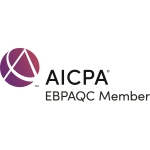Posted by Maria T. Hurd, CPA, RPA
 Does your 401(k) or 403(b) plan auditor belong to the AICPA’s Employee Benefit Plan Audit Quality Center (EBPAQC)?
Does your 401(k) or 403(b) plan auditor belong to the AICPA’s Employee Benefit Plan Audit Quality Center (EBPAQC)?
To demonstrate their commitment to quality in the performance of ERISA audits, 2,600 CPA firms, about a third of the firms that perform EBP audits, have become members of the Employee Benefit Plan Audit Quality Control Center (EBPAQC). In general, firms that belong to the EBPAQC have designated leadership in charge of establishing minimum quality control policies at the firm level, ensuring the necessary education and competencies of engagement personnel, and are subjected to benefit-plan-audit-specific oversight through the inspection and peer review programs.
More specifically, to be eligible to be a member of the EBPAQC, a firm must:
- Designate an audit partner to have firm-wide responsibility for the quality of the firm’s ERISA employee benefit plan audit practice.
- Have all audit partners of the firm residing in the United States and eligible for AICPA membership be members of the AICPA.
- Establish a program to ensure that all ERISA employee benefit plan audit engagement personnel possess current knowledge, appropriate to their level of involvement in the engagement, of applicable professional standards, rules and regulations for ERISA employee benefit plan audits. Such knowledge may be obtained from on-the-job training or training courses or both.
- In general, an individual signing audit opinions and an individual managing ERISA employee benefit plan audit engagements must complete a minimum of 8 hours of employee benefit plan-specific continuing professional education (CPE) every three years. See the Center website for more specifics.
- In general, require the audit partner designated with firm-wide responsibility for the quality of the firm’s ERISA employee benefit plan audit practice to participate in an annual Center-sponsored Designated Partner planning webinar on recent developments in employee benefit plan auditing each year. See the EBPAQC website for more specifics.
- Establish policies and procedures specific to the firm’s ERISA employee benefit plan audit practice to comply with the applicable professional standards and EBPAQC membership requirements. These policies and procedures must be documented and appropriately communicated.
- In addition to meeting the quality control standards requirement for monitoring, establish annual internal inspection procedures that include a review of the firm’s ERISA employee benefit plan audit practice by individuals possessing current experience and knowledge of the accounting and auditing practices specific to ERISA employee benefit plan audits. The engagements inspected should be representative of the firm’s ERISA employee benefit plan practice, considering the number and different types of plan audits (e.g., defined benefit, defined contribution, health and welfare, multiemployer, ESOPs, limited and full scope) and the various locations at which those audits are performed. The internal inspection should include reviewing the firm’s compliance with the EBPAQC membership requirements. The internal inspection reports specific to the ERISA engagements should be made available to the firm’s peer reviewer.
- Make publicly available information about its most recently accepted peer review as determined by the Executive Committee, which can be sent via email ebpaqc@aicpa.org or faxed to 919-419-4772.
- Have its ERISA employee benefit plan audits selected as part of the firm’s peer review reviewed by individuals employed by a EBPAQC member firm. Periodically file with the EBPAQC information about the firm and its ERISA employee benefit plan audit practice, and agree to make such information available for public inspection, as determined by the Executive Committee.
- Pay dues as established by the Executive Committee.
- Comply with additional requirements as may be established by the Executive Committee and approved by the AICPA Board of Directors.
As a benefit of belonging to the EBPAQC, member firms have access to resources to establish firm best practices, planning and audit engagement tools and aids, and current educational information to stay up to date on DOL and other important employee benefit plan audit developments.
Plan sponsors can check the EBPAQC website to verify potential auditors’ membership as one of the steps in seeking a quality auditor.
However, the requirements of membership, such as EBP-specific quality control documents, minimum CPE hours, Internal Inspection, and Peer Review, are not terribly onerous mandates. Plan sponsors should view EBPAQC membership as a minimum first step to a much greater list of qualifications that an EBP audit team should possess to be a true specialist. For more guidance on what questions to ask when assessing a prospective auditor’s competencies, please refer to our blog, How can plan auditors evaluate prospective auditors?
